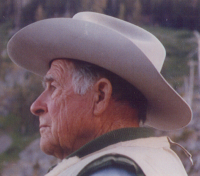

|

|
IN MEMORIAM
Woodrow Wilson Middlekauff
Professor of Entomology Emeritus
UC Berkeley
1913 – 2013
Woodrow Middlekauff was born February 11, 1913, in Hagerstown, Maryland, and passed away in Davis, California, May 19, 2013, at the age of 100. His father, a policeman, was killed in the line of duty when Woodrow was very young; their mother raised him, a brother, and sister with help from relatives. An uncle who enjoyed hunting and fishing often took young “Woody” with him and encouraged his interests in natural history, plants, animals, birding, and training falcons. This led to a biology major in college, which he pursued during the Great Depression via a scholarship at Juniata College in Huntington, Pennsylvania. He completed a B.S. in biology (1935), and went on to earn an M.S. (1936) and Ph.D. (1941) in entomology from Cornell University. While at Cornell he married Phyllis Buckman, from Philadelphia, also a Juniata College graduate. She predeceased him in 2003, after more than 60 years of marriage.
Woodrow Middlekauff was an instructor in economic entomology at Cornell from 1938 to 1942. In February 1942 he joined the U.S. Army and during the remainder of World War II served as Assistant Entomologist, First Lieutenant, and Captain, while working with Dr. Stanley Freeborn. Middlekauff rose to the rank of major as Director of Entomology at the U. S. Army School of Malaria in Panama, during which he produced several reports on mosquito biology. Professor Freeborn, a renowned medical entomologist and mosquito specialist who eventually became Chancellor at the University of California, Davis, was instrumental in launching Middlekauff’s academic career. In January 1946, Woody was appointed Assistant Professor at the University of California, Berkeley. His primary research emphasis at Cornell and his commitment to the Experiment Station at Berkeley focused on insect pests of field crops (tomatoes, melons, and walnuts). He was interested particularly in testing the toxicity and efficacy of the newly developing chlorinated hydrocarbons and problems associated with their application and residues. He taught courses in insects of field crops, fundamentals of applied entomology, and related topics with Professor A.E. Michelbacher and other colleagues. In addition, Professor Middlekauff acted as graduate advisor and French examiner for the Department of Entomology (graduate student requirements in those days included reading and grammar exams in two foreign languages, unheard of today). He was promoted to Associate Professor in 1955 and Full Professor and Assistant Dean of the College of Agriculture (later College of Natural Resources) by 1965, an appointment he held until his retirement in 1980.
Quite independently, Woody developed an interest in taxonomy of sawflies (Hymenoptera) while at Cornell. He continued this research throughout his career, well into retirement, producing monographs of several genera of Pamphiliidae (1957-1969), as well as Siricidae, Cephidae, and Orussidae, and of pine sawflies, Xyelidae, with his student, Donald Burdick. Woody also studied horseflies and deerflies (Tabanidae). Indeed, he wrote the first California Insect Survey Bulletin which treated them (1950), and subsequently produced an expanded revision with Professor Robert Lane (1980). Woody orchestrated production of a California Insect Survey Bulletin on grasshoppers with his former student, David Rentz, and H. F. Strohecker. That volume treats more than 200 species, many of which are rangeland pests. Professor Middlekauff was among the last of the old-school economic entomologists cum taxonomists, who contributed a great deal to the development of systematics. He produced monographic works in three Orders of insects, Orthoptera, Diptera, and Hymenoptera. His bibliography includes 121 research titles.
After retiring, Woody occupied a small office in the Essig Museum of Entomology, which he used almost daily, curating our sawfly, horsefly, and grasshopper collections. His interests stimulated other museum scientists to emphasize those insect groups. Woody was an inveterate outdoorsman. For example, he pursued one of his passions, fly fishing, throughout his life, making about 20 trips to New Zealand to seek the much larger trout that abound there. For those of us who had the pleasure of knowing and interacting with Woody, whether professionally or recreationally, he will be remembered fondly as a true gentleman, a good colleague, and someone who enjoyed life to the fullest. But gradual loss of eyesight curtailed his activities in later years and when no longer able to drive, during his early 90s, he moved to Davis, where his son and daughter-in-law cared for him. Professor Middlekauff is survived by his elder son, Jeffrey, daughter in-law Joan, and two grandchildren. His younger son, David, was killed during military service in Vietnam in 1967.
Jerry A. Powell
Cheryl B. Barr
Robert S. Lane